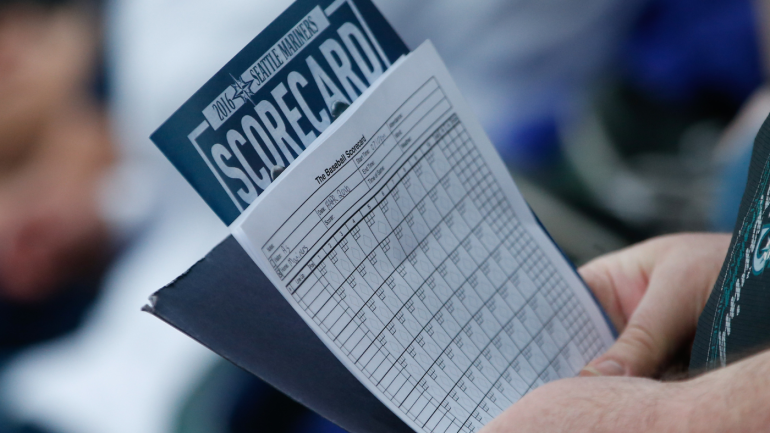
Welcome to Snyder's Soapbox! Here I pontificate about a matter related to Major League Baseball on a weekly basis. Some of the topics will be pressing matters, some might seem insignificant in the grand scheme of things and most will be somewhere in between. The good thing about this website is it's free and you are allowed to click away. If you stay, you'll get smarter, though, that's a money-back guarantee. Let's get to it.
Have you ever heard someone complain about "analytics" and thought to yourself that there's no way the complainer would be able to clarify exactly what he or she is talking about if pressed for specifics?
Me, too! It feels like almost any time I watch a game anymore. This isn't something that's limited to baseball and, in fact, we'll likely hear plenty of it revolving around the Super Bowl this coming weekend, just as we did, specifically, after the NFC Championship game.
It's those people who have decided that everyone who has ever looked at a statistic before making a decision is the biggest loser on the face of the Earth. You know who I mean.
The analytics say [insert absolutely anything and feel free to make stuff], but I just don't like it.
The insinuation is that the people who disagree might've arrived at their stance based on statistical data and only a pencil-necked geek would do such a thing. They use spreadsheets and calculators in that front office.
Analytics? Pssssh. How lame. "Go back to your computer, nerd," he types into a social media app on his phone, oblivious to, well, seemingly everything. "How's your mom's basement?"
The funny thing here is not only that every decision by coaches in sports has something to do with a number, on some level and at some point, but also that baseball has been a game of numbers for well over 100 years. There's just a segment of the baseball world now that believes every single poor result is due to "the analytics" making decisions for people.
It's just incredibly easy -- too easy, in fact, because it's lazy -- to throw out, "the analytics" as a culprit when something bad happens.
A starting pitcher is pulled before the third time through the batting order and the bullpen loses the game. Yep, analytics. You don't like the batting order your favorite team has in a big game and it doesn't score enough runs. Those damn analytics.
Maybe it was just a bad decision on which reliever to use. Maybe the decision was fine and defensible but the result just didn't work (this is most often what actually happened). Maybe the lineup construction doesn't matter near as much as the players in the lineup performing.
Nah, it's those losers and their computers!
Don't we want to at least try to dig a little deeper? Be a little smarter with the argument? Think?
Oh wait, we're back in trouble. Being smarter and thinking are for those losers on their computers. Thinking? In sports? LOL, man. Get a life.
The real baseball fans know that we aren't supposed to care about these complicated stats and we shouldn't be forced to do math. It's sports, not school, after all. We like simple and easy, like ...
- Take the number of hits divided by the number of at-bats. An at-bat isn't every time a player goes to bat, though, so remember to ignore walks and hit-by-pitches. They just don't count one way or the other, as if it never happened. If a player is deemed to have sacrificed himself, whether via bunt or a fly ball that scores someone, that doesn't count either. Again, though the player batted, just pretend it never happened. See! It's really easy and there's no thinking at all. This is called batting average.
- If a starting pitcher's team wins, he gets a win. See? Simple. But wait, maybe not. That starting pitcher has to have been in the game with his team in the lead and then he can get the win. Well, wait. If they lose the lead after he leaves the game, he doesn't get a win, even if the team still ends up winning. He also has to pitch at least five innings. If he doesn't, the next pitcher who comes in the game can get the win, as long as the team was winning and doesn't lose the lead. Maybe. The official scorer could also pick someone else who pitched.
All these newfangled stats just don't have the simplicity of the old ones, huh?
While we're here, no, I'm not a hardcore new-school stat guy. I'm only trying to illustrate that the old stats seem easy to us because we grew up with them and we just, at this point, innately know how to understand them. If they were invented nowadays, though, the same people who love them would mock them. Because they'd be new stats and new stats are dumb and for the computer-loving nerds. The cool people just like batting average and wins.
If you actually want to know what stats I like, I'll tell you most of them, old school and new. There's nothing wrong with liking a lot of information. If you want me to pick, I think on-base percentage is the single most important stat in the sport. The defensive side is tasked each inning with getting three outs so it can leave the field. OBP almost literally measures the ability of the offense to prevent that defensive side from doing its job. The higher the percentage of the times a team gets on base, the harder it is for the defense to end the inning and, as such, the chances of winning flow upward from there. Obviously a high-OBP offense matched on the same team with a pitching staff that excels are preventing runners would then be an excellent combo.
I'm not dismissive of the old stats, either. Hell, OBP is somewhat old on its own. It's not like it's xwOBA or something. Look at any of my articles and you'll see I reference batting average and wins plenty. I think the people who believe batting average doesn't matter are fooling themselves. OBP and slugging percentage are more important, but the entire triple slash line is how you'll find the best and most well-rounded players.
Now, I also don't care if you disagree on my OBP stance. It doesn't hurt me (you're wrong, but why would that bother me?). It doesn't hinder my ability to watch a game and that's where I'm lost as to all the vitriol toward seeing newer stats. You'll see people saying the new stats are "ruining the game." It's confusing, because we can so easily ignore the stats we don't care about. I know this for a fact because I ignore spin rate, for one. Yeah, I took interest in the sticky stuff ordeal, but on a daily basis, anytime there's a reading on the screen about spin rate, I just think about other stuff.
I'm urging everyone who has claimed seeing WAR on their TV screen is ruining the game for them to try my route this coming season. You are not required to freak out when you see a number that you don't care about.
Now, obviously different people value certain stats differently and in stuff like awards voting and Hall of Fame discussions, invariably stats will be used and people will disagree, but that's always happened and always will. It still doesn't actually impact our viewing of on-field play.
I imagine another avenue here would be the claim that the decision-making being guided by numbers is actually ruining the game and I'd strongly disagree.
Decisions have always been guided by numbers, at least as long as anyone alive can remember. How far back does the "platoon advantage" thing (use a lefty pitcher vs. a lefty hitter!) go? That's numbers-driven. They used lineups back in the 1800s and those were decided based on numbers. The way bullpen usage was decided back in the 1970s was stat-driven. This is absolutely not a new thing.
I'm not immune. I don't like the de-emphasis on the workhorse starting pitcher. I hate "the opener," and I often say it's my "old man yells at clouds" thing. I think teams have overthought themselves in the playoffs by having starting pitchers only going two or three innings at times. I'm sure there are numbers behind it, though, and my problem isn't with the analytical departments for doing their jobs. I just think maybe there's a better way to build and utilize pitching staffs in the playoffs. And as much as I don't like "opener," I'll try not to be too focused on the term itself.
Sometimes people get too caught up in new terminology, too, you know? Like launch angle and exit velocity.
Settle down, please. Listen for a second with an open mind. This should be easy.
Launch angle: Don't you remember way back in the old days hearing things like "drive the ball in the air." Of course you do. Don't lie. That's launch angle. That's all it is. It's just a new name.
Exit velocity: "Just hit it hard somewhere!" That's it. That's all it is. Just hit the ball hard. We all heard that in Little League and as adults we've all said it plenty of times. Exit velocity is just measuring how hard the batter hit it.
And, again, when you see the specific numbers, you are free to ignore them. You most certainly aren't required to know what the optimal launch angle is for a power hitter. Ignorance can be bliss.
But also, sometimes it isn't bliss. When a broadcaster or radio host or player or fan scoffs at something bad that has happened, blaming "the analytics," is just unnecessary ignorance. Everything is numbers. While blaming the bad things on analytics will get cheap support, we should strive to be better. Get specific.
What about the decision was bad? It wasn't just "analytics." There was more. Dive into the more. Was it a good process and bad result? That happens in sports a ton and it isn't because analytics. There is always more to the story. We can do better than lazy.
That's all I ask here. Just don't paint everything with the same brush. Avoid the "it's analytics" trap. That's for lazy people.






















